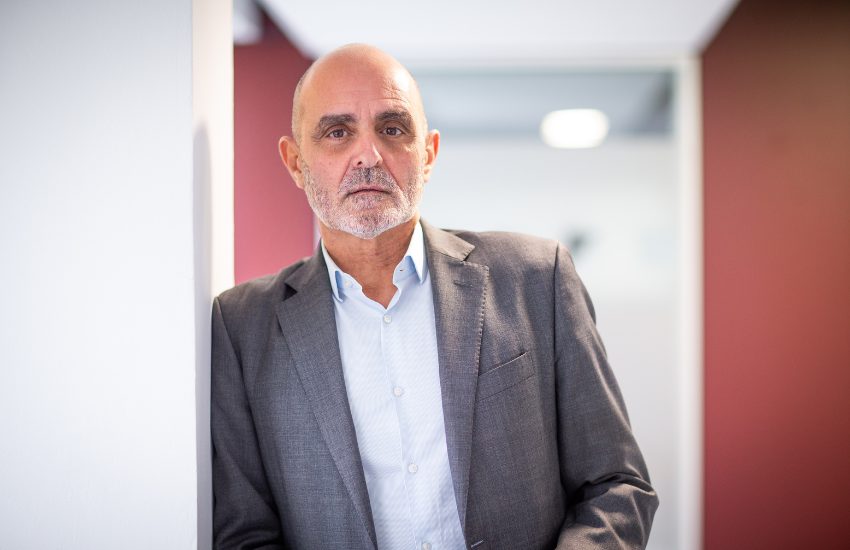"The sector is much more robust than in the past and is in a better position to cope with what is to come; I don't rule out more defaults".
Alberto Aza, spokesman for the banking association CECA, which groups together the banks that emerged from the transformation of the former savings banks and the only two surviving institutions of this type in Spain at present, does not foresee a "deposits war" with increases in the return on deposits due to the rise in interest rates, as there were in the past, but he does foresee improvements in attracting customers. Aza, who has close ties to Asturias and is a native of the region (he is the son of the Asturian diplomat Alberto Aza Arias, who was secretary general of the Royal Household), argues that Spanish banking is "much more robust than in the past and is in a better position to cope with what is to come". He considers the new tax on banks to be a mistake because it will be detrimental to financial stability, economic activity and employment, and believes that Spain is one of the most financially inclusive countries and has the third densest branch network in Europe, despite office closures. He believes that economic forecasts should be treated with the utmost caution because they are contingent on energy and geopolitical developments.
–Rising rates benefit the banking sector because they increase its margins, but they can fuel defaults and dampen demand for credit. Will the outcome be favourable or detrimental to the sector?
We have experienced a decade of negative rates that have narrowed brokerage margins drastically, which has impacted profitability. Margins are now starting to increase, but we do not believe that we will return to the positive rates of the past, so banks will have to continue to work on improving their efficiency and operations. It will be more expensive for banks to finance themselves and we could also see a rise in default rates and a decline in the demand for credit.
–Will the pros and cons balance out?
It will depend on the intensity of the rate increase, the energy market and geopolitical developments. One has to be very cautious with forecasts, but the banking sector today is much more robust than in the past and is in a better position to cope with what is to come.
–The cost of mortgages is already rebounding with the Euribor, but the remuneration of deposits is lagging behind. Will excess liquidity delay the return on savings?
There is plenty of liquidity due to the expansionary measures of the European Central Bank (ECB). But we are already seeing that Eurozone banks are starting to make offers and Spain is one of the most competitive markets. This trend of improving the remuneration of savings is likely to be accentuated.
–Is it possible to specify timeframes for when bank accounts will return to profitability?
Yes, it is premature. But we are in a competitive market. I don't think we will see a deposits war as in the past, but we will see improvements in attracting customers.
–Do you expect default rates to rebound because of inflation, rising interest rates and the economic slowdown?
Default rates remain low. They have not rebounded. But we do not rule out the possibility that they could rise due to the international context and uncertainty.
–Is it possible to speak of real estate risk because of the increase in the mortgage market?
No. The balance sheet of the banking sector is very healthy and the real estate sector does not carry as much weight as in the past.
–How do you see the Spanish economy?
Any forecasts should be interpreted with caution because they may need to be revised. The economy seems to be slowing down, although it will continue to grow. According to Funcas, Spain will grow by 4.5% this year, which is a very high rate, although we will see if this ends up being true. Funcas forecasts that in 2023 the economy will grow by 0.7%. Both growth and inflation forecasts have to be treated with great caution because we do not know how energy and geopolitics will evolve.
–You state that the banking market is very competitive, but the sector has been accused of having become oligopolistic following the large merger process it underwent since 2011.
The highly competitive nature of the Spanish banking sector is internationally recognised.
–Is there scope for further mergers?
These are decisions specific to each bank based on business criteria. They also depend on efficiency, which is already very high. Based on this criterion, we should not see any further large mergers. But this will depend on each bank. We have an intermediate level of concentration by European standards and a very efficient banking system.
–The significant reduction in branches and employment has caused unease in territories with poor in-person service.
Despite the intense reduction in the number of branches and ATMs, Spain has, according to a recent study by IVIE, the third densest network in the EU, behind Bulgaria and France, taking into account the population. Compared with an average of 3,232 inhabitants per branch in Europe, the ratio in Spain is 2,463. In terms of ATMs (with 2020 data), we have a ratio of 957, which is 27% lower than the EU average (1,312), but we are the fourth country in the area with the highest density behind Austria, Portugal and Croatia.
–But there are claims of growing bank exclusion, especially in rural areas and in the so-called "emptied Spain".
The IVIE report shows that we are one of the most inclusive countries. Some 98.4% of the Spanish population lives in municipalities with at least one point of access to financial services. Our starting point is a very robust network and structure. We also have the second most digitalised banks in the world. In rural areas, banks have been developing alternative channels, such as mobile branches, financial agents and agreements with non-bank operators, such as the Spanish Postal Service and various retailers, to dispense cash. We are in talks with the Ministry and we have created a working group to address those municipalities with more than 500 inhabitants.
–Older and less tech-savvy people complain of restrictions in personalised customer service.
In February a decalogue of measures was implemented to reinforce personalised attention to older customers. It is revised every six months with the Bank of Spain. In the first assessment, 100% of banks had already implemented measures and 81% of branches have extended opening hours from 9 a.m. to 2 p.m. for 6 million customers. A telephone customer service hotline has been set up and 92% of ATMs have been simplified. We are delivering above our commitments.
–Are you concerned about competition from new technology-based financial services ("fintech") companies?
Competition is good and necessary. And "fintech" firms are stakeholders that foster competition. But we all need to play by the same rules. "Fintech" firms are gaining market share because they are not subject to the same regulation. The regulations governing the banking sector are very strict. Regulation is designed to protect customers, but what would happen if customers of operators not covered by the Deposit Guarantee Fund were left unprotected?
–The long-awaited European banking unity is delayed. Is an agreement on the horizon?
Work in this direction is ongoing. There are still outstanding issues to be resolved. But there is a desire to move forward. Many regulations need to be harmonised.
–What is your opinion on the new tax on banks?
It is a clear mistake. The banking sector is one of the most heavily taxed sectors. Our tax rate is 53% after including taxes and the contribution to the Deposit Guarantee Fund. The new tax affects financial stability because it will lead to a sharp drop in earnings, reduce credit and thus harm the real economy and job creation, and it clashes with constitutional principles. A supposed windfall profit is taxed, one that does not exist. Some estimates project job cuts of between 5,000 and 25,000, but the Institute of Economic Studies (IEE) forecasts a 0.4% decline in GDP and a reduction of 72,000 jobs.
–Have the three banking associations considered merging?
Associations are meaningful to the extent that their members find meaning in them, and within CECA there is recognition of its importance. But we collaborate with the other two associations and jointly defend the interests of our member entities. Each has its own distinguishing features. In our case, it is the existence of social welfare and cultural works (Obra Social), which in the case of the banks that emerged from savings banks is carried out by the banking foundations that participate in their capital. Year after year, social welfare and cultural works continue to represent the largest social investor, accompanying families in times of difficulty and, due to their territorial proximity, with the capacity to identify and anticipate needs.













